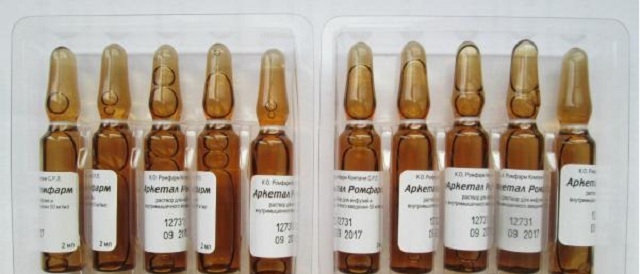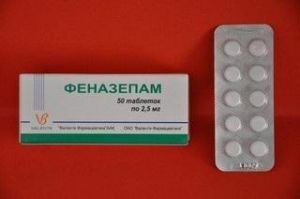 Phenazepam is a psychotropic drug, it is part of a group of tranquilizers and sedatives that act primarily on the central nervous system.
Phenazepam is a psychotropic drug, it is part of a group of tranquilizers and sedatives that act primarily on the central nervous system.
The main active substance of the agent is bromodihydrochlorophenylbenzodiazepine. By its activity, the drug Phenazepam surpasses the analogs, also having a pronounced hypnotic, anticonvulsant and muscle relaxant effect.
Its use with other psychotropic hypnotic drugs leads to a significant depression of the central nervous system, that is, the effect is enhanced.
After the first oral intake of the drug, its maximum concentration in the blood is observed after an hour and a half, the substance is withdrawn within 5-17 hours.
Contents
- Formulation and Composition
- Formulation and Composition
- Action of Phenazepam on the Body
- Areas of Use
- Contraindications to the Use of
- Special Groups of Patients
- Dosages and Method of Use
- Symptoms of Overdose and Adverse Reactions
- Interaction with Other Drugs
- Thoughts aloud
- Pros and cons of the preparation
Formand composition
Preparation Phenazepam is available for oral use in the form of tablets of 20 pieces. There is also a solution for intravenous and intramuscular injection. In neurology, a drug in the form of tablets is more often used, it is prescribed in conditions of inpatient and outpatient treatment.
Solution for injection is used extremely rarely, with severe mental disorders in the acute period when the patient can not take drugs in the form of tablets.
The action of Phenazepam on the body
The drug has a complex effect on the body:
- soothing - the drug depresses the central nervous system, inhibits excitation;
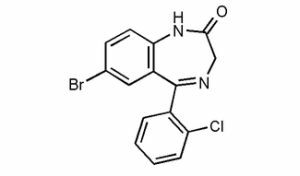
Bromodihydrochlorophenylbenzodiazepine formula
- sleeping pills - under the action of the drug sleep quickly, nerve impulses are transmitted at a lower rate;
- anti-anxiety - subcortical neurons of the brain become less sensitive, sensations become blunted;
- elimination of neuroses and psychoses - patients notice improvement in perception, go through hallucinations due to inhibition of processes in the subcortex of the brain;
- anticonvulsant - the medication copes well with the symptoms of epilepsy, muscle spasms.
The medication has a complex effect on the processes of the central and peripheral nervous system. Due to the preparation of phenazepam, a person ceases to react to external stimuli, can sleep normally in case of insomnia, goes through anxiety, fear, panic attacks and nervous twitching of the limbs.
The drug is good for cramping, it is a strong tranquilizer, therefore it is prescribed exclusively by a doctor.
Phenazepam has an effect on the central and peripheral nervous system, and if the dosage is incorrect or self-medication, the risk of disruption of brain function increases, side reactions and actions occur.
Fields of application
The drug is used in neurology and psychiatry to treat pathologies of the brain and nervous system. The drug also found active use in the complex treatment of patients with acute and chronic mental disorders.
Indications for use with Phenazepam:
- neurotic and psychopathic disorders of of various origin, which are accompanied by anxiety, fear, and consciousness disorder;

- exacerbation of fear of , severe irritability and emotional lability;
- launched neuroses of an unknown etiology;
- preparation for surgical operations of with the aim of suppressing the central nervous system and eliminating seizures that may interfere during treatment;
- relief of delirium and alcohol abstinence , that is, the elimination of symptoms that occur after a sudden drop in alcohol by people with alcohol dependence;
- obsessive states, hypochondriacal manifestations of , caused by a malfunction of the nervous system or the administration of other psychotropic drugs.
Tranquilizer is used in neurology more often for soothing effects, lifting seizures for false epilepsy and for sleep disorders.
The drug may be prescribed only by a neurologist or psychiatrist, selecting an individual dosage.
Contraindications to use
Drug Phenazepam has the following contraindications for use:
- increased sensitivity of the body to the main active substance;
- visual impairment, eye diseases, including glaucoma;
- acute alcohol poisoning with impaired function of vital organs;
- respiratory insufficiency, acute pulmonary diseases;
- children under 18 years of age, pregnancy and lactation;
- hepatic and renal insufficiency;
- presence in the history of drug dependence;
- acute lung and cardiovascular disease;
- is an organic disorder of the brain.
Interesting video about Phenazepam - a modern look:
Special groups of patients
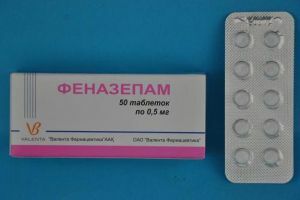 Drug Phenazepam is contraindicated in children under 18 years of age, during pregnancy and lactation, treatment with the drug is allowed, but in practice it is used extremely rarely, replacing safer drugs.
Drug Phenazepam is contraindicated in children under 18 years of age, during pregnancy and lactation, treatment with the drug is allowed, but in practice it is used extremely rarely, replacing safer drugs.
The effect of the drug on the fetus is unknown, insufficiently studied. In the first trimester, taking it is contraindicated, in the second and third there may be indications, but neurologists often select other means.
It is not recommended to use medicines by elderly people, which is due to the unpredictability of the reactions of the weakened organism.
Paradoxical reactions may appear on the preparation, therefore it is contraindicated in case of unknown violations before the conclusion of diagnosis. In case of severe depression and with suicidal tendencies, the drug should be used with caution.
Dosage and method of use
Psychotropic medication Phenazepam in the form of tablets is prescribed for oral administration, under steady-state conditions, the daily dosage of the drug is up to 4 mg, for the treatment of convulsions with epilepsy, the dose is increased to 9 mg. With outpatient treatment, up to 0.5 mg of the drug is prescribed once a day.
For the purpose of lifting alcohol withdrawal, the patient is prescribed 5 mg of medication per day. For the treatment of sleep disorders - 1 mg for half an hour before rest. The maximum daily dose should not exceed 10 mg.
Phenazepam is actively used in the treatment of personality disorders, especially often with depersonalization, then the daily dose is from 3 to 20 mg, depending on the severity level. This high dosage is due to the fact that patients with depersonalization are resistant not only to the main active substance of the drug, but also to negative side manifestations.
Symptoms of overdose and adverse reactions
Adverse reactions to the drug appear if the contraindications are ignored, if the dosage is not observed.
The occurrence of complications can not be ruled out spontaneously, when the patient's body reacts unpredictably to treatment. Adverse reactions can be associated with an incorrect combination of psychotropic drugs in complex treatment.
Adverse reactions are manifested from the central and peripheral nervous system, urogenital organs, heart, kidneys, lungs.
Overdose and adverse reactions to the drug Phenazepam:
- From the central nervous system - there is drowsiness, constant fatigue, inability to concentrate,
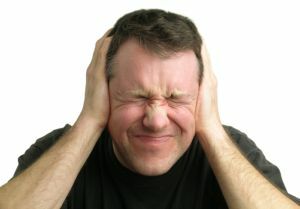 disorientation, the patient walks unsteadily, there is dizziness. In severe cases, the mental disorder is aggravated, which needed to be stopped by the drug, the patient becomes irritable, aggressive, a tremor appears. There may be a depressed mood, suicidal attempts, severe fear, hallucinations and many other accompanying manifestations.
disorientation, the patient walks unsteadily, there is dizziness. In severe cases, the mental disorder is aggravated, which needed to be stopped by the drug, the patient becomes irritable, aggressive, a tremor appears. There may be a depressed mood, suicidal attempts, severe fear, hallucinations and many other accompanying manifestations. - On the part of the gastrointestinal tract - dental diseases caused by constant dry mouth, indigestion, vomiting and nausea, disruption of kidney and liver, jaundice, impaired appetite and total refusal of food.
- On the part of the excretory organs - delay or incontinence of urine, hematuria, dysmenorrhea, renal insufficiency, violation of the level of libido.
- Dermatological symptoms of - redness of the skin, rash, itching, urticaria, swelling;
- Local reactions of for intramuscular or intravenous administration of phenazepam in ampoules - swelling of the skin, venous thrombosis.
In overdose, the patient is drowsy, confused, oppressed reflexes, palpitations. The first aid consists in washing the stomach, the patient is given activated charcoal, symptomatic therapy is performed. In severe cases, hemodialysis is prescribed.
Interaction with other medicines
Features of the effects of phenazepam on the body in combination with other substances:
- co-administration with Eidovudine may cause toxic effects of this drug on the body;
- in Parkinson's disease reduces the effectiveness of the main drugs for treatment;
- increases the toxic effect on the body when treated with inhibitors of microsomal oxidation;
- increases pharmacological efficacy while concomitantly administering antipsychotics, hypnotics and antipsychotics;
- simultaneous administration with Clozapine may cause impairment of the respiratory system.
Thoughts aloud
Reviews of practicing doctors and ordinary people who have been taking or are taking phenazepam.
As a hypnotic, the drug Phenazepam is effective. If taken in moderation and in the indicated dosage, no effects are observed.
I will not recommend anyone, as this is a doctor's task, but I will only say that the medicine helped me very much to overcome insomnia, which lasted about six months.
Alexey, 42
I take the drug every day for three years, I do not know if it's safe, and what the consequences might be. I'm afraid of crowded places and sudden death, the medicine dulls the alarm, but it seems that dependence has already appeared.
Alina, 35
Psychotropic medication Phenazepam is prescribed for severe neurological and psychiatric disorders. Self-medication or its appointment to eliminate superficial symptoms is dangerous and not justified.
You can assign it only after a thorough diagnosis and for a limited period. There are many contraindications, therefore with this preparation it is necessary to work cautiously.
General Practitioner's Psychiatrist
Pros and Cons of
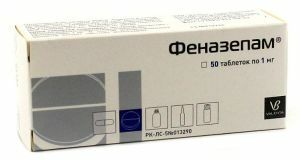 Phenazepam is a potent drug, and after taking it, a person can behave unpredictably. Among the indisputable advantages of the drug can be identified its effectiveness in the treatment of neuroses, sleep disorders, epilepsy.
Phenazepam is a potent drug, and after taking it, a person can behave unpredictably. Among the indisputable advantages of the drug can be identified its effectiveness in the treatment of neuroses, sleep disorders, epilepsy.
The disadvantage of the drug is its pronounced inhibitory effect on the CNS, long-term use of the drug can cause dependence and irreversible changes.
Prescribe this drug quite often in the treatment of neurological and mental illnesses, but it still causes controversy among physicians. Many doctors are of the opinion that it is time to replace phenazepam with modern analogues with a smaller list of adverse reactions.

